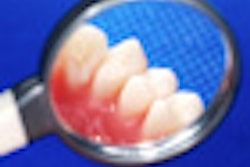A chemistry professor at the University of Connecticut has created a method for accurately detecting multiple proteins in the bloodstream that indicate the presence of oral cancer, according to an article posted on the school's website.
James Rusling, PhD, and his colleagues' method for detecting the protein interleukin-6 was created in 2010. While it was an indication that a person had oral cancer, the single biomarker was not sufficiently definitive.
The improved method attaches antibodies to proteins that reach high levels when cancerous cells are present. After performing several steps, the antibodies send out an electric current that is read by a sensor chip with another antibody embedded in it, according to the article. It is capable of detecting eight different signals.
The detection sensitivity was higher than has ever been previously demonstrated when it was used to detect four different proteins.
The National Institutes of Health's National Institute of Biomedical Imaging and Bioengineering funded the research. Dipak Dey, PhD, of the university's department of statistics and researchers from Maryland, Rhode Island, and Malaysia were collaborators.



















